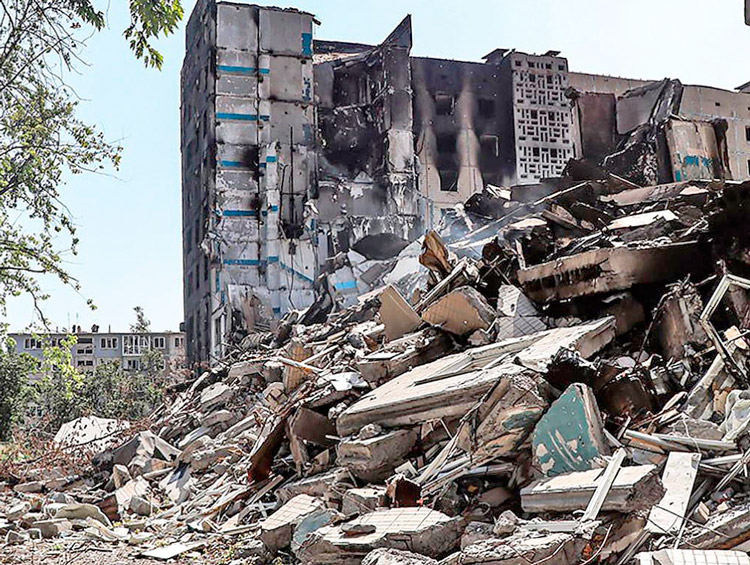The U.S. rulers are pressing the Ukrainian government to back off from conquering the full restoration of its sovereign borders, after more than two and a half years of Moscow’s invasion and war. Washington’s goal is to advance its own imperialist interests in the region, not defend Ukraine’s sovereignty.
President Joseph Biden’s administration is Kyiv’s main military supplier. But it gives just enough so Ukrainian forces avoid defeat, but not enough to decisively repel Russian President Vladimir Putin’s invasion. Washington and its allies hope that Kyiv, outmanned and outgunned, will be forced into making concessions.
While in the U.S. to speak at the United Nations, Ukrainian President Volodymyr Zelensky lobbied Biden Sept. 26. He requested more and speedier supplies of U.S. weapons without limits on their use on military targets inside Russia. The White House promised some more military aid but with firm constraints on its use.
U.S. rulers press Kyiv to compromise
Zelensky also met with both U.S. presidential contenders, Kamala Harris and Donald Trump. The former president said he was confident he could broker a positive deal between Zelensky and Putin “quite quickly.”
Harris claims Trump’s plan is to force Ukraine to “surrender.” But in fact whether a Democrat or Republican is in the White House, the U.S. ruling families’ plans for the region remain broadly the same.
Washington’s overriding aim is to stabilize the region to further its own political, economic and military interests. The U.S. rulers have utilized the war to expand the reach of their own military forces across Europe and the reach of the U.S.-led NATO alliance. They are reasserting their place as the dominant military power on the continent in preparation for more bloody wars to come.
Their goals are aided by the liberal press. A New York Times headline claimed “As War Gets Bleaker, More Ukrainians Appear Open to a Peace Deal.” In fact, working people in Ukraine have fought and continue to fight with far more courage and determination than any capitalist politician or commentator in the U.S. thought possible when the invasion began.
Capitalist powers in Europe are also pressing Ukraine to make concessions. “We need an end to this war,” German Foreign Minister Annalena Baerbock bluntly said at the U.N. Sept. 25. Berlin has slashed its 2025 military aid to Ukraine and joins in imposing limits on the use of the long-range weapons it provides Kyiv.
At the cost of massive losses in suicidal human-wave attacks, Moscow is now making small advances on the eastern front. Almost all the 5,000 troops of Russia’s 155th Naval Infantry Brigade were killed, badly injured or captured during the yearslong battle for Vuhledar. Russian forces took the hilltop mining town Oct. 1 after Ukrainian units retreated to avoid encirclement.
A 31-year-old Russian private who surrendered to Ukrainian forces Aug. 29 told the Wall Street Journal, “There is no morale. Everyone is afraid. Commanders say: ‘Faster, faster, faster.’”
“Their commanders show them no pity whatsoever,” Vodoliy, a Ukrainian company captain, told the Journal. “Our morale is much higher. But there are more of them.”
Kyiv reported Oct. 4 that over 2,000 Russian soldiers had recently contacted its “I want to live” hotline, seeking a way to surrender. Over a million people, including soldiers’ relatives, have sought information from the project’s website, which Moscow tries to block.
Russian workers are natural allies
Growing opposition to the war among working people in Russia — in and out of uniform — underscores the fact that they are the allies the Ukrainian people need in their struggle to defeat Putin’s assault, not Washington and the other imperialist powers. The solidarity of working people around the world, including in the U.S., is also important.
Two months after Ukrainian forces launched their incursion in the Kursk region of Russia they have not been pushed back. In the first invasion of Russian territory since World War II, hundreds of Russian conscripts have surrendered.
Ukrainian strikes have reached deeper into Russia with drones and missiles hitting military targets hundreds of miles from the front. Dozens of oil facilities, from Moscow to the occupied Crimean Peninsula, have been hit. Unlike Moscow’s strikes, they are not directed against civilian targets. New jet-powered drones are being built in Ukraine that are faster, with more explosive power. They’re hitting bases in Russia and occupied Crimea without Kyiv having to ask anyone’s permission.
On Sept. 21 huge munitions stores were hit in Tikhoretsk, in southern Russia, and in Toropets, in western Russia. At Tikhoretsk, one of Russia’s largest ammunition caches, 2,000 tons of high explosives erupted in a massive fireball. These losses to Moscow’s stockpiles have reduced its artillery advantage.
Moscow’s missile strikes keep targeting civilian areas as well as Ukraine’s energy infrastructure. By knocking out half the country’s power grid, Putin plans to extend the power outages and intensify the pressure on Ukrainian toilers to submit.
Putin is increasingly nervous about his position in Russia and his vulnerability to attacks by Ukraine. He has now abandoned use of his plush estate in Sochi on the Black Sea, fearing it will become a target.


